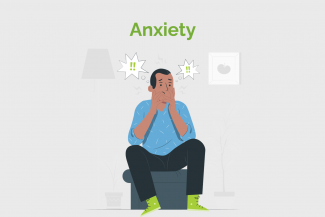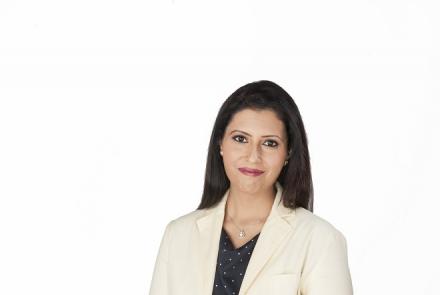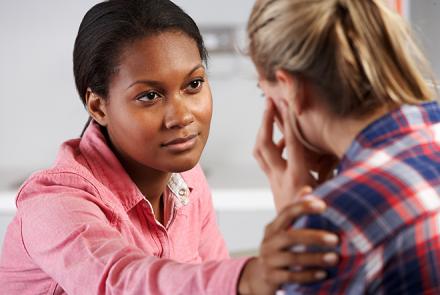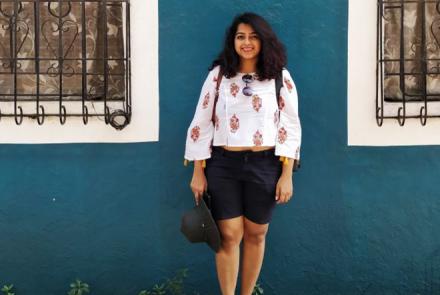
Anxiety disorders respond very well to treatment and often in a relatively short amount of time. The specific treatment approach depends on the type of anxiety disorder and its severity.
Mild symptoms may be relieved with lifestyle changes (eg regular physical exercise) and self-help (eg online e-therapies). Where symptoms of anxiety are moderate to severe, psychological and/or medical treatments are likely to be required. But in general, most anxiety disorders are treated with behavioural therapy, medication or a combination of the two.
Cognitive-Behavioural therapy
Cognitive therapy focuses on diffusing the thoughts (or cognitions) that are causing anxiety. Behavioural therapy focuses on altering the patient’s negative behaviour rather than on underlying psychological conflicts or issues from the past. Behavioural therapy for anxiety usually takes between 5 and 20 weekly sessions.
Together, they help you identify and challenge the negative thinking patterns that are making you anxious and deal with the resulting behaviour that fuels that anxiety.
It also teaches how to:
• Recognise when you’re anxious and what that feels like in the body
• Coping skills and relaxation techniques to counteract anxiety and panic
• Confront your fears (either in your imagination or in real life)
Exposure therapy
Exposure therapy encourages you to confront your fears in a safe, controlled environment. Through repeated exposures to the feared object or situation, either in your imagination or in reality, you gain a greater sense of control. As you face your fear without being harmed, your anxiety gradually diminishes.
Exposure therapy usually starts with a situation that’s only mildly threatening and works up from there. This step-by-step approach is called systematic desensitisation.
Systematic desensitisation allows you to gradually challenge your fears, build confidence and master skills for controlling panic. It includes three parts:
• Learning relaxation skills
• Creating a step-by-step list of fears
• Working through the steps
Medication : There are a variety of medications such as:
Benzodiazepines, which relieve the symptoms of anxiety. Doctors will only prescribe benzodiazepines if your anxiety is extreme or if you are in crisis. This is because they are addictive and you can build a tolerance to them.
Antidepressants like Selective serotonin reuptake inhibitors (SSRIs) are used to treat different anxiety disorders, including generalised anxiety disorders (GAD), panic disorder and obsessive compulsive disorder (OCD).
Beta-blockers can also help with anxiety. They are particularly useful if you experience physical signs of anxiety. They can help to lower a fast heartbeat, shakiness or facial flushing/ blushing.
But medication is most effective when combined with cognitive-behavioural therapy and anxiety self-help strategies. Medication may sometimes be used in the short-term to relieve severe anxiety symptoms so that other forms of therapy can be pursued.
Anxiety medications can be habit-forming and cause unwanted side effects, so be sure to research your options. It’s important to weigh the benefits and risks so you can make an informed decision about whether anxiety medication is the right treatment for you.
Complementary therapies that your therapist may also recommend:
Mindfulness, yoga and hypnotherapy.
E- therapies, which are online therapies or computer-aided psychological therapy : They can be just as effective as face-to-face services for people with mild to moderate anxiety. Most e-therapies teach people to identify and change patterns of thinking and behaviour that might be keeping them from overcoming their anxiety. An individual works through the programme by themselves, and although e-therapies can be used with or without help from a professional, most programmes do involve some form of support from a therapist. This can be via telephone, email, text, or instant messaging, and will help the person to successfully apply what they are learning to their life.
This online mode of delivery has several advantages. It:
- Is easy to access
- Can be done from home
- Can be of particular benefit for people in rural and remote areas
- Can be provided in many cases without having to visit a doctor.
Complications of anxiety may include the following:
- Inability to trust others
- Inability to form close relationships
- Problems with work
- Anxiety disorders, such as phobias or panic attacks
- Severe depression
- Problems with alcohol or drug abuse














